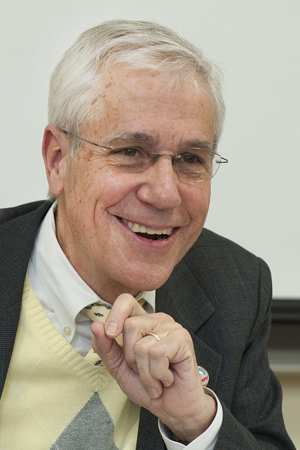
"The new director and I have tried to come up with incentives for encouraging volunteers to extend for a third year. We have the Peace Corps volunteer leadership program, which permits third-year volunteers to continue to work on development projects. They can also help by mentoring and coaching new volunteers, supporting the training process, and doing site development. With their experience and language abilities, third-year volunteers are invaluable."
William Stacy Rhodes, Peace Corps Chief of Staff says the Peace Corps now encourages volunteers to serve a third year
Celebrating Peace Corps Connection
Kudos for 1,200-plus alumni volunteers
By Leslie Friday
William Stacy Rhodes, Peace Corps chief of staff, last week addressed a group of School of Public Health professors and students, many of them returned volunteers. Photo by Vernon Doucette
Of two dozen people crammed into a Medical Campus conference room March 25, surrounded by maps of Africa, South America, and Asia, some were School of Public Health professors and some were students. Almost all were former Peace Corps volunteers.
Visiting BU to support the SPH Master's International Program, which integrates a master's degree in public health with 27 months of service in the Peace Corps, William Stacy Rhodes, Peace Corps chief of staff and a former volunteer himself, spoke of service in the corps as a "life-changing experience."
"It certainly teaches you a lot about the true meaning of extreme poverty and basic human needs," Rhodes said, lessons that resonate through the public health profession.
Rhodes also presented a plaque to the University in recognition of its position as a major source of incoming volunteers.
For 2010, BU ranks 18th nationally in number of alumni with bachelor's degrees currently serving in the Peace Corps, up two spots from last year. The University is third nationally in alumni with graduate degrees doing a Peace Corps stint. Since 1961, 1,246 BU alumni have served, placing it 20th among all-time producers of volunteers.
BU Today's Leslie Friday, a former Peace Corps volunteer, sat down with Rhodes before the public event.
BU Today: The Peace Corps has seen an 18 percent increase in applications this year. What do you attribute that to?
Rhodes: The most critical factor probably is President Barack Obama's call to service. No doubt the economy influences the number of applications we get, but it has been steady at about 12,000 to 13,000 in the past. This was a major jump just after the election.
As a candidate, the president said he planned to double the size of the Peace Corps. What has he done as president?
With President Obama's support, Congress approved a record level of appropriations for fiscal year 2010. There were some budget cuts during the prior administration, but now we have an increase from $340 million in 2009 to $400 million in 2010, which will permit significant growth in the number of volunteers.
Doubling the size of the Peace Corps will take a while. The last time the Peace Corps was over the 15,000 mark was 1966, and we've been under 10,000 volunteers since 1970. We hope to get back over the 10,000 mark by the 50th anniversary in 2011.
Does that mean expanding to new countries?
Absolutely. When Peace Corps director Aaron Williams and I started last fall, we were in 74 countries. Since that time, we have signed agreements with Sierra Leone and Indonesia. We're currently talking to two more countries.
You served in Bolivia from 1968 to 1970. How did that experience affect you?
I had a brief career in law, but having been in the Peace Corps made me want to work in international development overseas. So I left my legal career to do something that turned out to be far more interesting and enjoyable, which was work in the foreign service with USAID in five countries over a 25-year period.
Based on my Peace Corps experience, the first year is about figuring things out, the second when you really dig in to work. Is it a common perception that just when you feel you can effect change, you leave?
Absolutely. The new director and I have tried to come up with incentives for encouraging volunteers to extend for a third year. We have the Peace Corps volunteer leadership program, which permits third-year volunteers to continue to work on development projects. They can also help by mentoring and coaching new volunteers, supporting the training process, and doing site development. With their experience and language abilities, third-year volunteers are invaluable.
People in host countries often think volunteers are linked to the CIA and realize we aren't spies only after getting to know us. What is the link between the U.S. government and the Peace Corps?
The Peace Corps is most definitely a U.S. government agency. Volunteers are not, however, employees of the U.S. government. They are citizen volunteers. Nevertheless, they are always seen as representatives of their country. Indeed, they are ambassadors, in a very real sense.
I always felt safe, but the Peace Corps has been criticized for safety and security lapses. What has been done in response?
We spend a great deal of effort assessing the safety and security not only of a particular country, but of specific sites. Over the last few years, we've expanded our safety and security staff both in Washington and in the field. But, as you point out, the real key to volunteer security is acceptance in the community. Most communities are more than willing to assure the safety of volunteers.
Leslie Friday was a Peace Corps volunteer in Guinea, West Africa, from 2002 to 2004. She can be reached at lfriday@bu.edu; follow her on twitter @lesliefriday.












